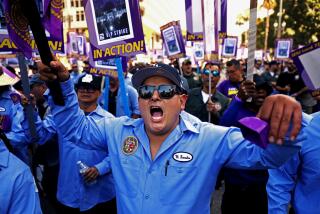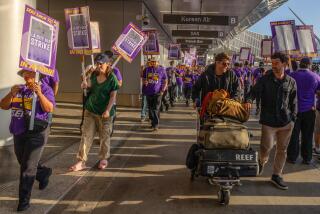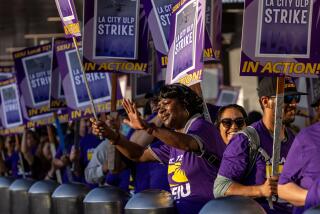Filipino Pickets Block Gates of U.S. Naval Base
- Share via
OLONGAPO, Philippines — Striking Filipino workers sealed off all three entrances to America’s sprawling Subic Bay Naval Base here in a job action that stranded hundreds of Navy personnel off base Saturday and left at least nine U.S. servicemen injured in attempts to enter through the picket lines.
Several of the strikers suffered stab wounds in the confrontations, but no fatalities or critical injuries were reported, according to local doctors.
The strike started at Subic over severance pay demands and spread later to the United States’ Clark Air Base, about 50 miles away, when union leaders there broke off negotiations with U.S. officials. The walkouts involved about 22,000 Filipino workers in all.
The Subic walkout began after hundreds of the 8,000 American base employees and Navy personnel had left the base Friday night for the restaurants, bars and nightclubs in Olongapo.
Form Human Barricades
The picketers formed human barricades at the gates to Subic, America’s largest naval base outside the continental United States, and announced over megaphones that no Americans would be permitted to enter or leave the facility until base officials allowed the Filipinos still working inside to join their picket lines.
On several occasions Friday night and throughout the day Saturday, groups of U.S. Marines in civilian clothes who had been prevented from returning to their barracks tried to push their way inside, sparking fistfights that left at least nine servicemen with cuts and bruises and some Filipinos with stab wounds, eyewitnesses said.
“We converted two of the discotheques in the city into medical aid stations,” said Navy medical corpsman Denise Dube, who was also stranded off base when the strike began. “We treated about four Marines for lacerations and bad cuts, but no one was injured seriously.”
Navy Chief Petty Officer Jack Leigh said that five servicemen suffered minor injuries Friday night.
Several Stabbed
A doctor at the city’s only major hospital said as many as half a dozen Filipinos had been admitted with stab wounds, but some apparently had been injured in a series of political protests outside Olongapo City Hall.
Official Navy spokesmen inside the base offered no comment on the incidents. No official U.S. Navy vehicles were permitted to enter or leave the base. But local officials, labor leaders and eyewitnesses said Saturday evening that no solution appeared to be in sight.
Dube and dozens of other American Navy personnel who were gathered outside the main gate to the base Saturday estimated that 1,500 base personnel were outside the military compound when the strike began.
“From their (the workers’) point of view, it was a good time for a strike,” Dube said. “It was a typical Friday night. Everyone was out partying.”
Union leader Leo Tolibas said that the tactics of the action were based on “people power”--the catch phrase used to describe the civilian and military rebellion that drove former President Ferdinand E. Marcos from the country Feb. 25.
Severance Pay Issue
“But this is not only people power, it is also workers’ power,” said Tolibas, a heavy equipment operator at Subic who said that the strike could last as long as a week or a month.
The principal issue, he and other union leaders said, was the union’s demand that the U.S. Navy agree to give workers severance pay if they resign.
“They agreed to this demand 10 months ago, and they have been just dribbling us along like a basketball,” Tolibas said. “The Filipino workers are being treated unfairly.”
Tolibas conceded, however, that his wage of about $1 an hour--the average for Filipino employees at Subic--is about 10 times that of many low-paid Philippine workers.
At Clark Air Base, Remigio Sembillo, president of the Clark Union of Filipino Civilian Employees, met Saturday with James Morse, a civilian labor administrator at the base. Sembillo said that workers at Clark, following the example of their counterparts at Subic, were setting up barricades around the air base.
But he said that pickets at Clark would allow military personnel and their dependents to pass.
Mayoralty Contested
Olongapo Mayor Richard Gordon, who confirmed that U.S. servicemen were beaten back in several attempts to enter the Subic base, said that the strike apparently was triggered by the political crisis in the city, where he has been mayor for the past six years.
“The union is trying to take advantage of the chaos here right now,” said Gordon, who was ordered to vacate his office soon after the government of President Corazon Aquino took power Feb. 25.
Gordon, who was a member of former President Marcos’ political party, contends that he was dismissed illegally by Aquino’s minister for local government, Aquilino Pimentel, and he has refused to leave his office.
Hundreds of his supporters have gathered outside City Hall to protect him, while the supporters of Teodoro Macapagal, whom Aquino appointed to the post, have tried to break through the human barricade and occupy the mayor’s office on behalf of Aquino’s choice for the post.
Troops Sent to City
“For the past four nights, there has been a war here,” Gordon said, adding that more than two dozen people have been injured in rock-throwing incidents and street battles with clubs and baseball bats.
In an effort to bring calm to the city, where Filipinos and Americans have long lived in harmony, Defense Minister Juan Ponce Enrile, a former member of Marcos’ party before he helped lead a 72-hour rebellion against Marcos, deployed riot troops in the city Saturday and ordered that Gordon remain in office--at least until the strike at Subic Bay Naval Base ends.
“I can talk to both parties,” Gordon said. “This is not my first strike here, and I’m happy to help--if only President Aquino permits it.
“The point is, the entire government is at a standstill. Nothing is working. As much as I’d like to mediate the strike, I can’t. There are two mayors here now, and everything has stopped. President Aquino has got to act, she must do something. What we have now is anarchy.”
U.S. Ties May Suffer
Gordon said that the situation in his city ultimately could damage relations between the United States and the Philippines, and he added, “My real fear now is that the radical left--the Communists--might try to take advantage of it.”
The Subic naval facility is surrounded by mountains, where Gordon said the Communist New People’s Army has been active for several years. The rebels so far have not interfered with the base’s operations or the city of Olongapo.
“Now is the time to be decisive,” Gordon said. “It’s going to be tense for the next couple of days, at least. But if somebody, somewhere, makes a decision, at least we can keep the violence to a minimum.”
The stranded American base personnel could not agree more.
“Somebody’s got to do something,” said Gregory Buck of Seattle, who has been based at Subic for the past eight years. “This people power is just getting out of hand. It’s becoming mob power--it’s becoming anarchy.”
More to Read
Sign up for Essential California
The most important California stories and recommendations in your inbox every morning.
You may occasionally receive promotional content from the Los Angeles Times.













